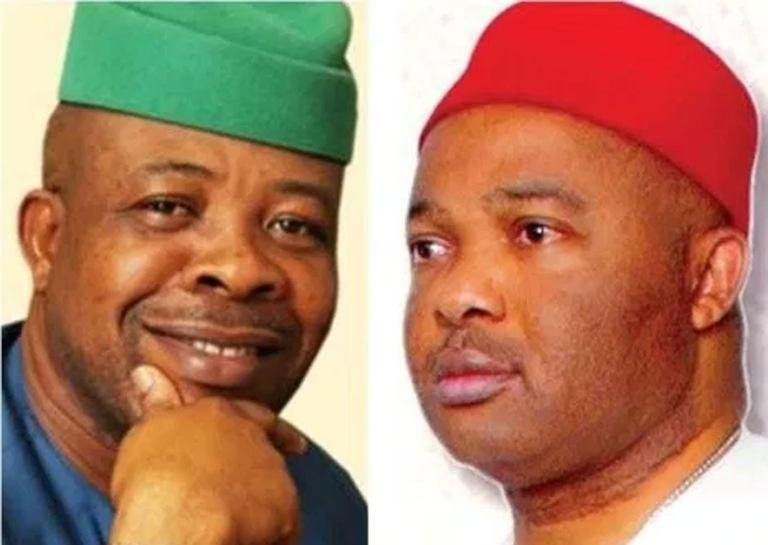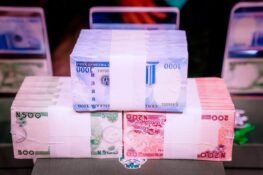The opposition People’s Democratic Party is up in arms over the sacking of Emeka Ihedioha as governor of Imo State by the Supreme Court. Well, it was controversial verdict. But not for the justices of the apex court.
To them, it was straight forward. The PDP is creating the impression that the nation’s highest court is now a threat to democracy, with its national chairman Uche Secondus calling the verdict a coup d’etat. That in itself is dangerous.
Without providing evidence, he even went as far as accusing all the seven justices who sat on the case of compromising and delivering judgement for political reasons.
Secondus went further suggesting that the justices were taking instructions from the Presidency before deciding politically sensitive cases. These are not accusations you make openly without backing them up with facts.
There is no denying it, the opposition party has reasons to worry about judicial independence in Nigeria considering that the APC government has in recent times forced out a sitting Chief Justice.
The government has also charged a number of judges to court over allegations of corruption and has given little consideration to the role of the National Judicial Council in the discipline of erring judges.
Yet, the Supreme Court has shown enormous courage in the last year or so and ahead of the general elections in February of 2019, particularly in disqualifying the ruling APC from state elections in Rivers and Zamfara states.
No one can pretend that the actions of the court were insignificant at the time they were taken or did not have an impact on the general elections.
But recently, the PDP has only taken on the cause of judicial independence when it has a stake in cases before the courts. That inconsistency does not exactly serve the interest of the party, the judiciary or the Nigerian people.
There is no denying it, the opposition party has reasons to worry about judicial independence in Nigeria considering that the APC government has in recent times forced out a sitting Chief Justice
To make matters worse, the party is quick to castigate judges when judgements don’t go their way and when the judgements do go their way, the judges were only doing their jobs.
That said, judgements of the Supreme Court or any court for that matter are not meant to be popular. They are also not meant to represent popular will. And in the case of Ihedioha and Hope Uzodinma, the verdict need not measure up to the abstract science of numbers and quantity.
The issue at hand was whether the returning officer had power to cancel some results, that is results from 388 polling units in this particular case.
And from those 388 polling units, one candidate, Hope Uzodinma of the All Progressives Congress got an unrealistic 213, 295 votes. To have rejected those specific results, the returning officer, Prof. Francis Otunta must have believed that the figures were fabricated. Most Nigerians think the same.
Besides, all that matters to the observing public in this case is that the numbers don’t add up when the 213, 295 votes the Supreme Court just rewarded now inaugurated Governor Uzodinma without putting the court’s reasoning into consideration. But it is typical of social media commentary, to focus on only one a small detail in the large volume of information that come out of court verdicts.
In the March 9, 2019 election, as announced by the Independent Electoral Commission, there were a total of 823, 743 accredited voters. Of those, a total of 714, 355 votes were accepted as valid. Ihedioha, who was declared winner by INEC had 273, 404 votes.
The candidate of Action Alliance, Uche Nwosu who second had 190, 364. In third place was Ifeanyi Ararume of the All Progressive Grand Alliance with 114, 676 votes. And Uzodinma, the man the Supreme has just handed victory had only 96, 458 votes. But in all, the 213, 295 votes the court has given the APC added to the 714, 355 of valid votes comes to 927, 650.
Without the more than 25,000 votes invalidated, that is still 103,907 more votes than the 823, 743 voters that queued up in Imo and were accredited by INEC on Election Day.
As long as the elections were held in Nigeria, it is almost safe to say that all of the parties did a little bit of rigging. It is every normal for each candidate to accuse the other or even an election official of cheating or compromising the process. Still, something always goes wrong during an election in Nigeria.
Someone will always sell out because politicians are always determined to win by any means necessary.
And to most Nigerian politicians, the end justifies the means. But what really matters during the process is whose side the electoral officers are on? Who are security officers on election duty siding with?
And what happens when both the electoral officers and the security agents on ground are working at cross purposes?
In this case, it was a deputy police commissioner that reportedly supplied the election tribunal with the 213, 295 extra votes Uzodinma needed to emerge winner in the contest at the Supreme Court. The same 213, 295 votes from 388 polling units had been thrown out by the collation officer.
So, Uzodinma may have just cheated his way to the governorship seat in Imo with the help of the courts. But was it an act of injustice by the apex court to have ignored the obvious rigging that took place during the election and allowed the APC candidate come up with his own results?
Judgements of the Supreme Court or any court for that matter are not meant to be popular. They are also not meant to represent popular will
Why should one aspect of the law, which the justices focused on and supposedly doesn’t give a returning officer the powers to cancel election results, take precedence over other sections of the electoral act that have to do with irregularities and manipulation of the process?
It’s obvious the Supreme Court was not interested in whether the number added up or not before declaring Sen. Hope Uzodinma. If they don’t add up, that is someone’s else’s error.
All that mattered to them was interpreting the aspect of law that was the bone of contention between the PDP and APC in the case brought before them.
That is whether a returning officer can cancel results, even when there are clear signs that numbers were simply being made up and election rigging was at play. And accepting the fact that the apex court has the final say in any given case, the justices can focus on any aspect of the law the think is most relevant.
But who takes responsibilities for the fact that the final results declared by the Supreme Court show clearly there were more votes than there were actual voters?
With their verdict, the justices are basically suggesting that it was someone else’s failure that led to this conclusion. It was someone else or some other institution that allowed for rigging to occur and a different set of results to be announced at polling units and then subsequently rejected at the collation center.
But the question is who should take blame, the election’s presiding officers at the polling units where the manufactured results first appeared; the collation officer who rejected the results when he lacked the powers to do so or the deputy commissioner of police who was supposedly subpoenaed and provided the duplicate copies of the rejected results to the tribunal?
Judging by the reactions on social media, in television commentaries, most Nigerian think the fault is with the justices of the Supreme for choosing to focus on the letter of the law rather than the spirit.
The end result is an image problem for the Court. And of course, the now widely held impression that our lordships are all bad at mathematics.








